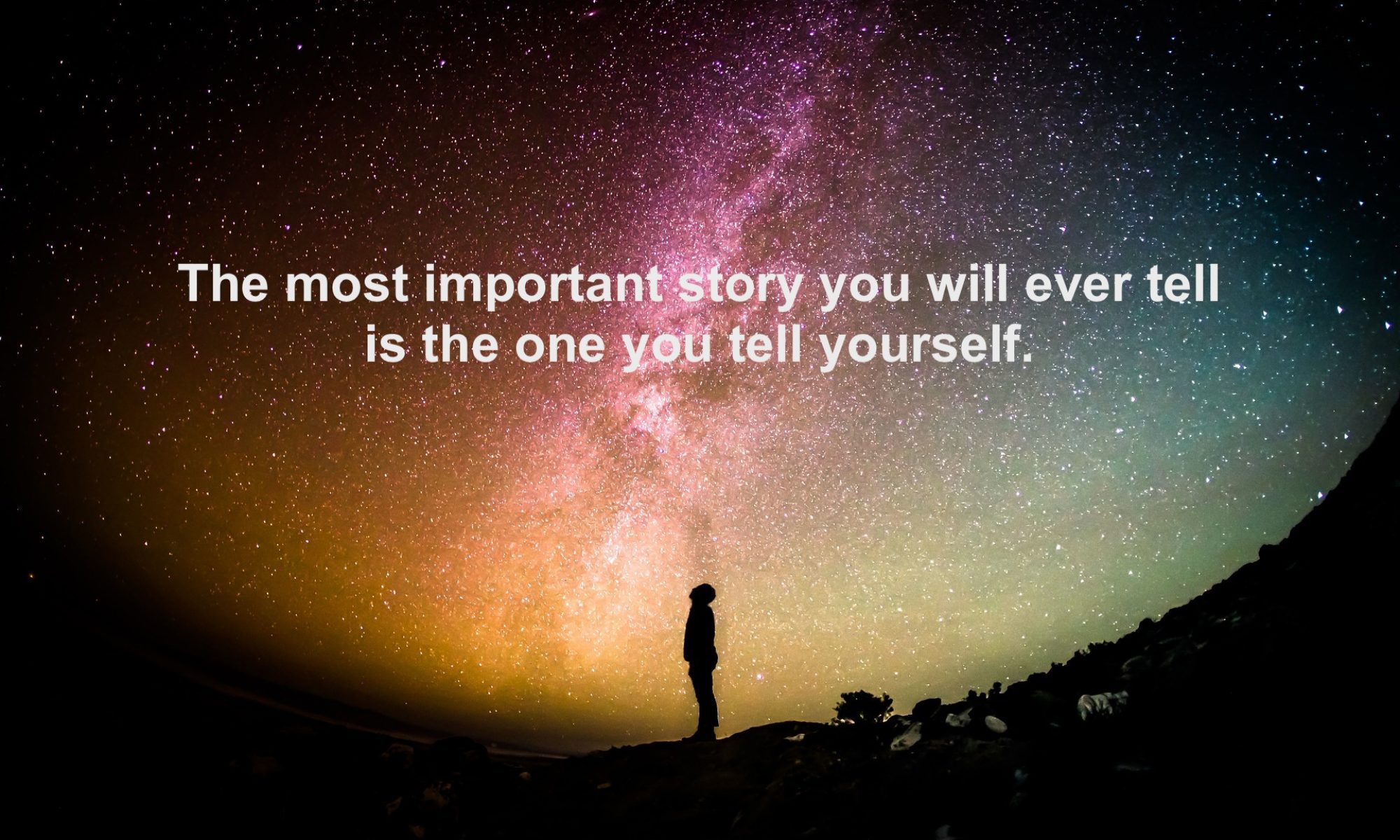Personal change is never easy. In fact, most people who embark on a self-improvement challenge make only modest progress, if any. We start an exercise routine and give up. We go on a diet, lose a few pounds, and then regain it all. We vow to become more enthusiastic and sociable, only to fall flat. Does any of this sound familiar?
Perhaps the most difficult thing to change is the voice in your head repeating negative messages. I’m not good enough. What if I fail? I’ll just embarrass myself. What if people form a negative perception of me? People don’t find me interesting or attractive. I never get the good opportunities. The voice drones on and on, and you can’t turn it off.
Where did this voice come from? This voice was shaped by your inner story—the set of fundamental beliefs about who you are and how you relate to others, your place in the world, and how life treats you.

Imagine you’re five years old. It’s the holiday season, and you have been visiting friends and relatives with your family. Your mother asks you to greet someone you don’t know, but you’re reluctant. Maybe you’re hungry, or tired, or overwhelmed by the parade of strange faces, or just uncomfortable in an unfamiliar place. You take evasive action and hide behind your mother’s dress. After some unsuccessful coaxing, your mother gives up and says, “Don’t mind him/her, he’s/she’s just shy.”
Shy, you think to yourself. Mother says I’m shy. Mother is so smart, she knows everything, and she would never lie to me. I must be shy. I wonder what shy means? I think it means I don’t like to meet people, or I’m afraid they won’t like me, or I don’t feel important or worthy or interesting. I’m shy.
This incident may seem insignificant, but to your five-year-old self it takes on a very real meaning. You may have misunderstood what happened, didn’t place it in the right context, or made an incorrect inference. None of this matters! Five-year-olds aren’t very good with nuance. They don’t understand words, themselves, people, relationships, or the ways of the world. Your child self does what it can to make sense of what’s happening and records it as a rule for living, along with other incidents that reinforce your beliefs. These rules, beliefs, assumptions, and expectations become part of your inner story. Meeting people is uncomfortable and threatening. They won’t like me. I’m not important or worthy or interesting. I’m shy.
As you grow up you try to make sense of the world and your experiences. Your inner story becomes a script for your life. When things don’t go well for you, you use your inner story to explain why. I knew they would ignore me—I’m not important. Another job application rejected—I’m not worthy. Of course she broke up with me—I’m not interesting.
If you follow the same patterns, enter into the same type of unsatisfying relationships, and experience the same outcomes, it’s because your inner story is leading you there.
However, this inner story is not accurate. How could it be? You wrote it when you were five years old!
As you got older, this false narrative tightened its grip on you. You have been living by this false inner story for so long you may not even recognize it as a story, you think it is simply who you are. You may not be aware that your script was written by your child self, and that it can be rewritten by your more experienced and enlightened present self.
Repeating affirmations, trying to change your mindset, practicing new behaviors, and other self-help techniques will not work if they only scratch the surface. If your inner story is not aligned with your new beliefs and behaviors they will not take hold. To truly develop you must get to the root of the problem and rebuild your life on a solid foundation with a new inner story.
How can you replace your old, inaccurate story with a new, empowering one? The process looks like this:
- Uncover your inner story
You will have to think back to some of your earliest memories. The fact that you can remember one or a few incidents from a period where almost everything has been forgotten is revealing: you remember those few events because they were formative. What assumptions, expectations, beliefs, and rules did you develop as a result of these incidents?
In the above example, being called shy may have created a belief that you don’t deserve to succeed or to get what you want. You don’t expect to have good things come your way, and when they don’t you explain the outcome by thinking I knew it, I never get what I want! This belief comforts you in your disappointment by explaining that it wasn’t you, it’s just the way things are.
- What’s wrong with it?
Try to understand how and why the false narrative came into being, the purpose it has served, and that you can change it. What does it mean? How did you misinterpret it? How has it affected you? Was it ever true? If so, is it still true now? Have you evolved?
Reexamine your story critically. Instead of trying to keep proving it to protect yourself (and prove you’re right), play the angel’s advocate (the positive alter-ego of the devil’s advocate) and try to prove you’re wrong. In other words, that imaginary little devil on your shoulder has been whispering words of comfort—lies—to make you feel better: it isn’t your fault, it’s just the way the world is. You want an angel on your other shoulder that will tell you the truth: It isn’t you, and it isn’t them. I’ll show you, see, the devil was wrong, your interpretation was wrong, and we’re going to fix it.
In our example, you might conclude that when you were small you felt intimidated by older or more powerful individuals, which deterred you from expressing or asserting yourself. While this may have continued for many years, you have since grown and matured. As an adult, you are no longer small and weak. You are not a pushover. You are often able to influence and positively impact others.
The fact that you may have been labeled shy as a child does not define you now. You don’t always get what you want, and neither does anyone else. But you often do, and as an intelligent, empathetic, accomplished professional you are able to achieve excellent results at least part of the time. With focus, effort, and skill, you are capable of accomplishing even more going forward.
- Rewrite your inner story
Can you reinterpret the situation, relationship, or another person’s intentions in a positive way? Change or eliminate the disempowering parts, and build up and enhance the empowering parts. Draw on your strengths, talents, and positive qualities.
Returning to our example, you might reframe or change your story to reflect new truths that you have discovered that just don’t align with your old story. I used to believe that I was shy, weak, and unable to stand up for myself. As a result I found it difficult to trust others and have confidence in myself. I played it safe and missed out on many opportunities. I now understand that my inner story was not accurate. I have much to offer and I want to contribute. I see that most people mean well and I can build positive relationships. If sometimes things do not work out it is not a reflection of me.
- Internalize your new narrative
This is the most challenging part. Your old story was lying to you for so long it will be difficult to replace. You will have to test your new story until it drowns out the old voice and becomes real to you. You might set up simple encounters designed to be easy wins, progress to more challenging situations, devise an affirmation, adjust your expectations of others, etc. There are many challenges you can set, and they should be matched to your needs. Some people are able to do this on their own, though most would do better with coaching.
This process of setting challenges and proving your new story takes time. It becomes easier as you progress through your program and see the results. You will feel like a new person—the person you were meant to be, with the life you deserve.
